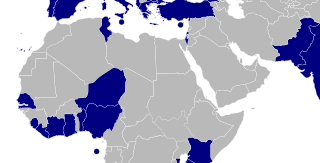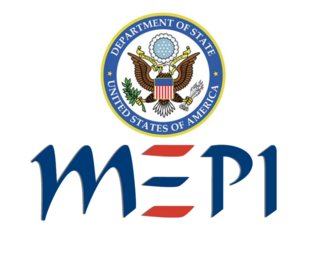Related Research Articles

Arab–Israeli peace projects are projects to promote peace and understanding between the Arab League and Israel in different spheres. These are part of a broader attempt at a peace process between Palestinians and Israelis. Sponsors of such projects can be found both in Israel and Palestine.

Michael Melchior is a Jewish leader, Orthodox rabbi, thinker, and activist. He is a former Minister of Social and Diaspora Affairs, a former Deputy Minister of Foreign Affairs, and a former member of Knesset for Meimad. He is the Rabbi of a community in Talpiyot, Jerusalem, while still holding the title of the Chief Rabbi of Norway.

According to The Economist Group's Democracy Index 2020 study, Israel is the only democratic country in the Middle East, while Tunisia is the only democracy in North Africa. The level of democracy in nations throughout the world published by Freedom House and in various other freedom indices, report the Middle Eastern and North African countries with the highest scores are Israel, Tunisia, Turkey, Lebanon, Morocco, Jordan and Kuwait. Countries that have been consistently labelled as 'not free' by Freedom House (2017-2021) have been Iran, Iraq and Egypt. They have been increasingly becoming more and more adverse to the idea of liberal democracy with their scores steadily decreasing, only Iraq out of these countries have maintained some level of internet freedom with a score of 41/100. The remaining countries of the Middle East are categorised as authoritarian regimes, with the lowest scores held by Saudi Arabia and Yemen.
Asia-Pacific Development Information Programme was an initiative of UNDP and "aims to promote the development and application of information and communication technologies for sustainable human development". Its sphere of work was the Asia-Pacific region. APDIP was based within the UN premises in Kuala Lumpur, Malaysia.

'Abd al-Rahman al-Kawakibi was a Syrian author and Pan-Arab solidarity supporter. He was one of the most prominent intellectuals of his time; however, his thoughts and writings continue to be relevant to the issues of Islamic identity and Pan-Arabism. His criticisms of the Ottoman Empire eventually led to Arabs calling for the sovereignty of the Arab Nations, setting the basis for Pan-Arab nationalism. Al-Kawakibi articulated his ideas in two influential books, Tabai al-Istibdad wa-Masari al-Isti’bad (The Nature of Despotism) and Umm Al-Qura. He died in 1902 of “mysterious” causes. His family alleged that he was poisoned by Turkish agents.
Partners for Democratic Change International (PDCI) is a global partnership of Partners for Democratic Change (Partners) and the nineteen independent, local organizations partners founded in Europe, the Americas, Middle East, and Africa that work to advance civil society, good governance and a culture of change and conflict management worldwide.
Tharwa Foundation is a nonprofit, nonpartisan grassroots organization that encourages diversity, development and democracy in Syria and the broader Middle East/North Africa. The Foundation derives its name from the Arabic word, tharwa. Founded in 2003, the Tharwa Foundation is an offshoot of the Tharwa Project, an initiative launched in Damascus Syria by Ammar Abdulhamid and Khawla Yusuf. Abdulhamid is a blogger, human rights activist and author. Yusuf is an author, politician, and human rights activist.

The U.S.-Middle East Partnership Initiative (MEPI) is a United States State Department program that fosters meaningful and effective partnerships between citizens, civil society, the private sector, and governments in the Middle East and North Africa (MENA) region to resolve local challenges and promote shared interests in the areas of participatory governance and economic opportunity and reform.

Tamara Cofman Wittes is an American writer and public figure. She is a senior fellow in the Center for Middle East Policy at the Brookings Institution. She directed the Center from March 2012 through March 2017. From November 2009 through January 2012, she was a Deputy Assistant Secretary for Near Eastern Affairs at the United States Department of State. Wittes has written about U.S. foreign policy, democratic change in the Arab world and about the Arab–Israeli conflict.

Alma Abdul-Hadi Jadallah, is a social scientist, internationally recognized mediator, facilitator and trainer, as well as a scholar-practitioner and educator with close to twenty years of experience in the field of conflict analysis and resolution, research and applied practice, peacebuilding, conflict prevention, and transformation. Since 2005, she has been the President and Managing Director of Kommon Denominator Inc., a private consulting firm.
Establishment

American democracy promotion aims to encourage governmental and non-governmental actors to pursue political reforms that will lead ultimately to democratic governance.
The International Centre for Policy Studies (ICPS) is an independent NGO, founded in 1994 which aims to promote public policy concepts and practice and apply them to influential policy research that affects both the public and private sectors in Ukraine.
PartnersGlobal, formerly known as Partners for Democratic Change, is a non-government organization founded in 1989 to build local capacity for conflict resolution and change management in the developing world. It does this through two main methods the first being the establishment of local, independent nonprofits of which there are 18 all of whom are members of the international network Partners for Democratic Change International which was formally established under Belgium law in 2004.

Bassma Kodmani was a Syrian academic who was spokesperson of the Syrian National Council. She was the executive director of the Arab Reform Initiative, a network of independent Arab research and policy institutes working to promote democracy in the Arab world.

Bernardino León Gross is a Spanish diplomat and politician and former United Nations Special Representative and Head of the United Nations Support Mission in Libya. Prior to this appointment by United Nations Secretary-General Ban Ki-moon, he served as the European Union Special Representative (EUSR) for the Southern Mediterranean. León is a former Secretary General at the office of the Spanish Prime Minister, Sherpa for the G20 and Spanish Secretary of State for Foreign Affairs. His diplomatic career has mainly been devoted to the Arab world.

The Arab Forum for Environment and Development (AFED) is a not-for-profit regional non-governmental organization, membership-based organization headquartered in Beirut, Lebanon, with the status of international organization; grouping experts together with the civil society, business community and media, to promote prudent environmental policies and programmes across the Arab region.
Laury Haytayan is a Lebanese oil and gas expert in the Middle East and North Africa. Since 2011, she has been leading the parliamentary capacity development portfolio at the Natural Resource Governance Institute (NRGI) in the MENA region, focusing on the legislative and oversight roles of Arab parliamentarians in advancing reforms in the Middle East Oil and Gas sector.

The Tahrir Institute for Middle East Policy (TIMEP) is a nonpartisan, nonprofit organization dedicated to raising awareness of democratic transitions in the Middle East through analysis, advocacy, and action.
Foreign aid for gender equality in Jordan includes programs funded by governments or non-governmental organizations (NGOs) that aim to empower women, close gender based gaps in opportunity and experience, and promote equal access to education, economic empowerment, and political representation in the Hashemite Kingdom of Jordan.
References
- ↑ "A Conference on civil society related issues opened yesterday". Algeria Events. 2007-11-22. Archived from the original on 2008-02-09. Retrieved 2008-01-31.
- ↑ "2005 North Africa, Levant, and Egypt Programs". Middle East Partnership Initiative. U.S. Department of State. Archived from the original on 2007-10-18. Retrieved 2008-01-31.
- ↑ "Participants in workshop form new media exchange group". ijnet. International Center for Journalists. 2007-10-04. Archived from the original on 2007-08-11. Retrieved 2008-01-31.
- ↑ "Al-Kawakibi Democracy Transition Center Presents Award for Excellence in Democratic Action". Democracy News. World Movement for Democracy. October 2007. Archived from the original on 2007-10-17. Retrieved 2008-01-31.